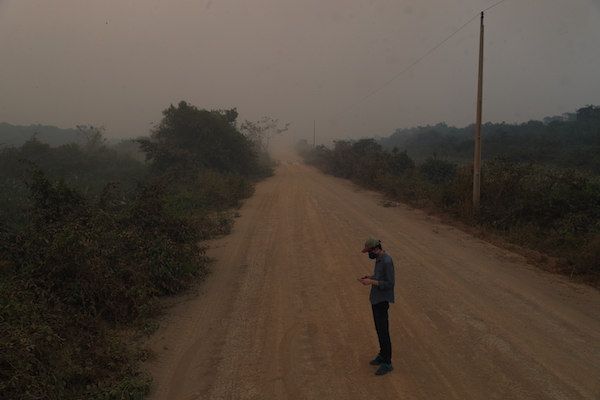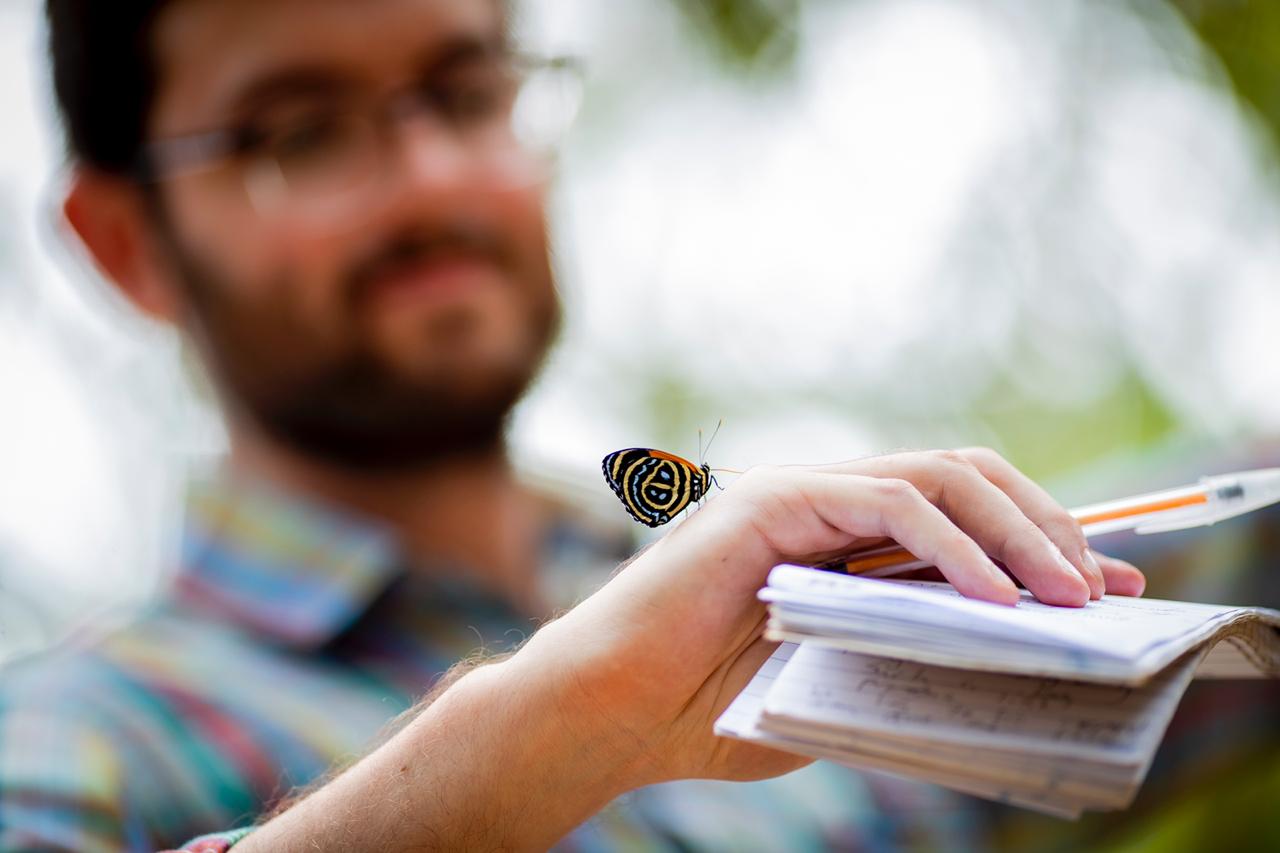SEJournal Online is the digital news magazine of the Society of Environmental Journalists. Learn more about SEJournal Online, including submission, subscription and advertising information.
 |
| Reporter Jake Spring reporting during fires that swept Brazil’s Pantanal wetlands. Photo: Amanda Perobelli, Reuters. |
Inside Story: Beat Reporter Looks to Get Ahead of the Story
Reuters correspondent Jake Spring is one of the few journalists bringing an international perspective to Brazil’s threatened environment, and the excellence of his coverage won him a second-place award for large market beat reporting in the Society of Environmental Journalists’ 20th Annual Awards for Reporting on the Environment. SEJ’s judges lauded his work about the effects of the fires that have destroyed much of the Pantanal region as vivid and fearless, and made note of the impact of his reporting, such as stories on shipments of unauthorized wood from the Amazon that prompted NGOs to sue the government and a story on divestment that led to a pledge from the government to act on deforestation. SEJournal Online recently caught up with Spring. Here is the conversation.
SEJournal: How do you get your winning story ideas?
Jake Spring: Whenever possible, I'm trying to think ahead to what could happen on the Brazil environment beat and then try to see if there is a way to get ahead of it.
On my story about the fires in the Pantanal, the world's largest wetlands, I had seen early local media reports that fires were ramping up to a very high level and had been watching the largest fires grow for weeks using a satellite tool developed by NASA. So I was ready when they sent me into the field to report it. On my exclusive about financial investors threatening to divest from Brazil over environmental concerns, I knew that the Bolsonaro government ignores NGOs but listens to businesses and investors. That gave me the idea to ask financial firms if they were considering divesting.
When COVID-19 hit, I thought it would probably affect how many environmental enforcement agents were sent to the field, so I started asking my sources about it. For the story on scientists measuring carbon in the forest, the second an organizer mentioned to me, "We do this activity a couple times a year that we like to call carbon camp," I immediately knew there was a story there.
And on my exclusive on illegal wood shipments, The Intercept Brasil (credit where it’s due) had an item in Portuguese on five questionable shipments of wood. I thought it was interesting, but only five? No big deal. I investigated further to find out it was much bigger and got leaked docs on how the government tried to retroactively legalize it.
SEJournal: What was the biggest challenge in reporting the pieces and how did you solve that challenge?
Spring: Reporting on the Pantanal fires in the field is easily the most dangerous assignment I've undertaken in my career. We had to make rapid decisions a couple of times on whether to press on through areas with fire nearby or to pull back. This was my first reporting trip during the pandemic, prior to vaccines being available, so there was also the added danger of COVID-19 that required us to take precautions.
SEJournal: What most surprised you about your reporting?
Spring: I'm often surprised that people in certain positions are willing to talk to me. My exclusive on rolling back environmental enforcement in the pandemic would have been a purely source-based story, but I made sure to call up government leadership on the record prior to publication. They ended up talking to me. On others, like the illegal wood exports, sources spoke to me who would face serious retaliation if their identities were revealed.
SEJournal: How did you decide to tell the stories and why?
‘I try to be a ‘just the facts’ journalist and let
my reporting guide me on how I tell the stories.
In many cases, the facts were big enough or
surprising enough that they spoke for themselves.’
Spring: I try to be a "just the facts" journalist and let my reporting guide me on how I tell the stories. In many cases, the facts were big enough or surprising enough that they spoke for themselves. The Pantanal fires were a bit different. I first found the scale of the fires amazing when viewed through the NASA satellite data tool. Traveling through the Pantanal in person, I saw what it looked like firsthand, a charred wasteland with dead snakes or other small animals every few meters.
Taken together, this sort of intense destruction multiplied across these thousands of square kilometers, the damage was really staggering. I sought to convey that in my story, leading with the bird's-eye-view image of a fire the size of New York City and then ending on a single snake we found dead, having bitten into its own flesh as it burned alive.
 |
| Encounter with a butterfly. Photo: Ueslei Marcelino, Reuters. |
SEJournal: Do the issues covered in your stories have a disproportional impact on people of low income, or people with a particular ethnic or racial background? What efforts, if any, did you make to include perspectives of people who may feel that journalists have left them out of public conversation over the years?
Spring: My reporting helps to shed light on the struggle to combat environmental destruction in the Global South. It highlighted the voices of scientists and others in Brazil, who are heard far less than experts in the United States or Europe.
SEJournal: What would you do differently now, if anything, in reporting or telling the stories and why?
Spring: I don't see what I would have done differently on these stories. I got lucky and did the right thing, the right way, at the right time.
SEJournal: What lessons have you learned from your stories?
Spring: Developing expertise over time and continuing to follow the same stories long term will pay off. In my case, the overarching story has been Brazil's environmental destruction under the Bolsonaro government. Even in 2020, when many journalists rightly pivoted to report on the pandemic, it paid off for me to keep hammering away on the Brazil environment story where I could do my best work. When you have a big story, latch on and don't let go.
SEJournal: What practical advice would you give to other reporters pursuing similar stories, including any specific techniques or tools you used and could tell us more about?
‘Talk to people when you don't need
anything from them. That is the way
to build relationships and sources.’
Spring: Talk to people when you don't need anything from them. That is the way to build relationships and sources. If the first time you're calling a sensitive source is the time you need something from them, usually it's not going to work.
SEJournal: Could you characterize the resources that went into producing your prize-winning reporting (estimated costs, i.e., legal, travel or other; or estimated hours spent by the team to produce)? Did you receive any grants or fellowships to support it?
Spring: Because of the pandemic, many of these stories were reported from my desk by spending endless hours on the phone, requiring few resources. For my stories on scientists measuring carbon and the Pantanal fires, the trips were costly since I needed to fly to the regions from Brasilia, rent a vehicle, buy fuel and stay in a hotel. The costs were paid by Reuters without any outside funding. In the field, I worked every waking hour for about a week in both instances, sometimes 16-plus hours a day in the case of the Pantanal fires.
Jake Spring is a Reuters correspondent, based in Brazil since 2017. Prior to that, he lived in China for six years where he worked for Reuters in Beijing and served as editor-in-chief of China Economic Review in Shanghai. A graduate of Northwestern University, he is fluent in Chinese and Portuguese.
* From the weekly news magazine SEJournal Online, Vol. 7, No. 27. Content from each new issue of SEJournal Online is available to the public via the SEJournal Online main page. Subscribe to the e-newsletter here. And see past issues of the SEJournal archived here.














 Advertisement
Advertisement 



